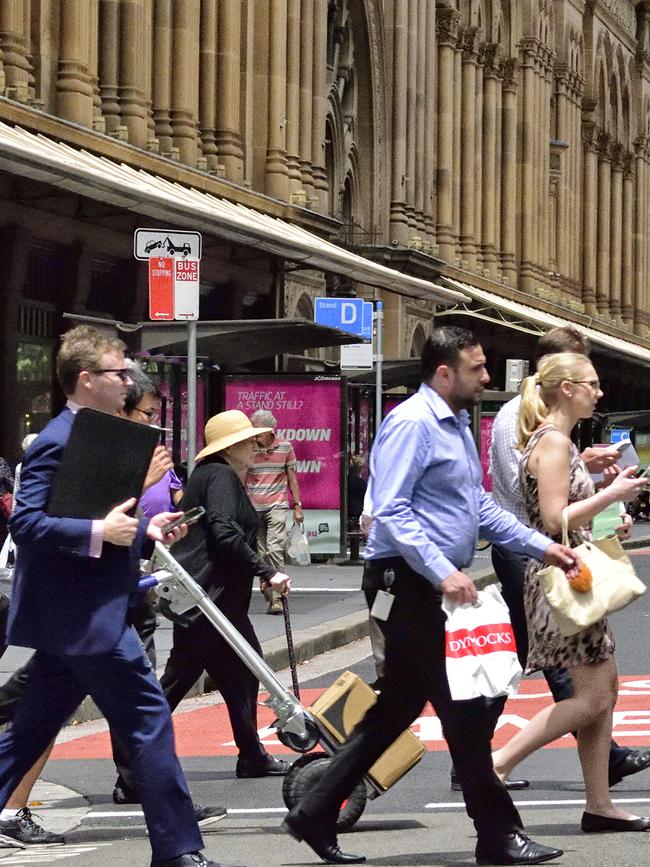Photo reveals our attitudes towards work in 2024
Our attitudes towards work have been completely exposed by a single photo that has gone viral online, causing employees to rage.
At Work
Don't miss out on the headlines from At Work. Followed categories will be added to My News.
A photo of four workers sleeping at their desks has exposed huge differences in our attitudes towards work.
In Australia, a photo of people sleeping at their desks might seem like more of a cry for help or a wild new Gen Z trend, but in Japanese culture, it isn’t seen as slacking.
Taking a nap at work is known as “inemuri” and can be seen as a sign of dedication and hard work, rather than having a snooze on the company’s dime.
The exact source of the photo showing four workers sleeping at their desks is unclear, but it appears to have first gone viral in 2022 and is now making the rounds again online.
The photo was recently reshared on X, formerly Twitter, and has unearthed a big conversation about whether this should become normalised in western culture, too.
It was shared with the caption, “Normalise naps at work”, with the post being viewed more than nine million times and generating hundreds of comments.

A few years ago, during the peak of relentless hustle culture, a photo like this might have garnered praise and displayed commitment to staying at work no matter what.
But today, in our post-pandemic era where work-life balance is not just accepted but promoted, the response was quite the opposite.
There was an immediate outcry from workers who saw it as the opposite of a healthy, balanced life.
“Maybe figure out why they are napping at work?” one asked.
“Go home,” another recommended.
“Normalise six-hour work days,” one countered.
“What about working less instead of having to sleep at work?,” another asked.
“Oh hell no. Shorten hours so people can have a life,” one person instructed.
“Can we not work ourselves to death?” someone else asked.
There’s been a huge shift in work attitudes in recent years, with Gen-Zers embracing trends like quiet quitting, where they do the absolute minimum amount of work required for their roles, or bare minimum Mondays, which is pretty self-explanatory: They don’t do much on Mondays.
The term “lazy girl jobs” also went viral on social media last year, where young women shared high-paying jobs they’d found that didn’t involve too much work.
The tide has shifted and people are using work more as a vehicle to fund the rest of their lives, rather than making work their lives.

The only praise the idea of napping at work received was from people championing the concept of resting while getting paid.
Certainly, no one was advocating for napping at work in order to be able to stay longer and put in extra hours. Nope, it was quite the opposite.
“If naps at work were normalised, productivity would actually skyrocket. Rested minds are sharper, period,” one wrote.
“During working hours? OK! Paid nap? I’m in,” another claimed.
“Sometimes I take a nap instead of eating during my lunch break,” one shared.


Recruitment expert Roxanne Calder told news.com.au that she doesn’t want to napping at work becoming normal.
“When you go to work, you are there to work, and then you go home to rest. You go to work for eight hours, you have eight hours of rest and eight hours of leisure,” she said.
“Why would you want to come to work to nap? You should come to work to be social and napping is not social.”
Ms Calder isn’t prepared to accept the idea that having a little snooze at your desk is a good thing.
In fact, she said that this is the time where workers should be showing how capable they are, not having rests at their desks.
“We have an issue of productivity and efficacy, and people are worried about AI, technology, and all sorts of things. I believe our human skills will never be outdone by machines, but we have to work on them,” she said.
The recruitment expert said that right now in Australia, when it comes to our work ethic, we’ve “lost our edge”, and employers are scrambling because of it.
“When speaking to employers, they are struggling to find people who want to commit and love their jobs,” she said.
Ms Calder said that fewer workers are “putting in the extra effort” and because we’ve become so “conscious” about not overworking people, it has come at the cost of “productivity”.
She explained that managers are now overworking themselves to keep workplaces running so everyone else can have work and life balance.
“In the interest of everyone else’s wellbeing, the managers have to pick up the slack, and then their wellbeing and mental health is impacted,” she said.
Ms Calder thinks the photo has continued to go viral because being “negative” about work is trendy.
“You wouldn’t have a picture going around on X of someone loving their work,” she said.
Originally published as Photo reveals our attitudes towards work in 2024





